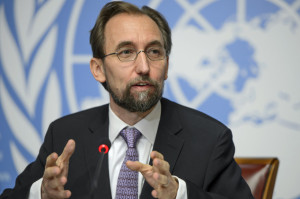
(AA) – The UN High Commissioner for Human Rights insisted Wednesday that talks are ongoing with Japan over making amends for its colonial era enslavement of thousands of women.
Marking the second day of a trip to South Korea, Zeid Ra’ad Al Hussein was seen warmly greeting three ex-comfort women during a visit to a shelter in Seoul.
Having grown tired of local efforts, a separate group of South Korean former sex slaves had announced a day earlier that they would file legal proceedings against Japan in a United States court if Tokyo fails to sincerely apologize to them by the end of this month.
The Japanese government has long maintained that all reparation matters related to its 1910-45 colonization of Korea were broadly settled by a treaty that was signed 50 years ago this week.
But international pressure has been building on Tokyo, including last year when U.S. President Barack Obama referred to Japan’s past sexual slavery as an “egregious violation of human rights”.
Visiting the South Korean capital for the opening of a new human rights office, Zeid turned his attention from the previous day’s topic of North Korea to the plight of now elderly former comfort women.
“We are talking to the authorities in both countries,” Zeid was quoted as saying by local news agency Yonhap.
He also promised to stay in contact with the women, and to “continue to advocate on their behalf”.
Just 50 surviving victims of Japanese sexual slavery are known to South Korean authorities.
Hopes were raised earlier this week that Japanese Prime Minister Shinzo Abe might directly confront their suffering — both he and South Korean President Park Geun-hye vowed to improve ties following a first visit to Tokyo by Seoul’s Foreign Minister Yun Byung-se.
Since taking office in 2013, Park has so far refused to hold an official bilateral summit with Abe because of his perceived refusal to face up to Japan’s historical abuses.